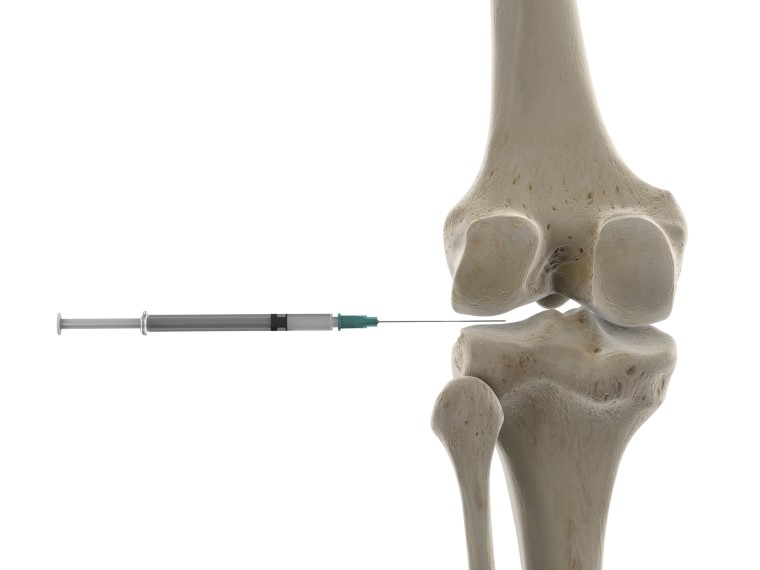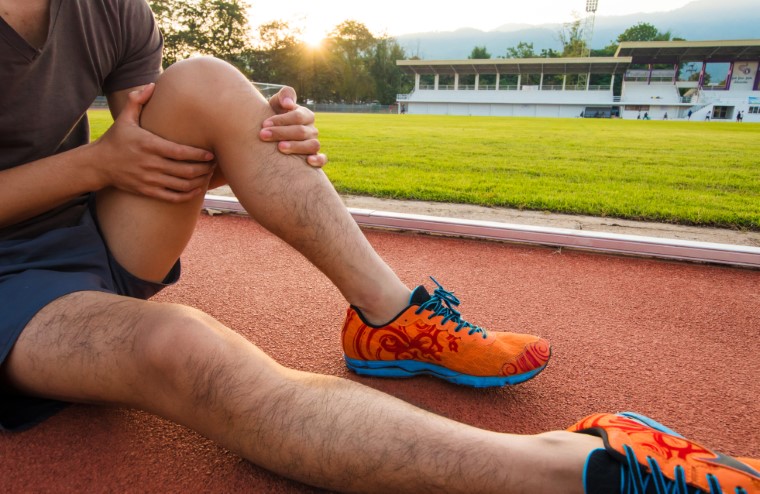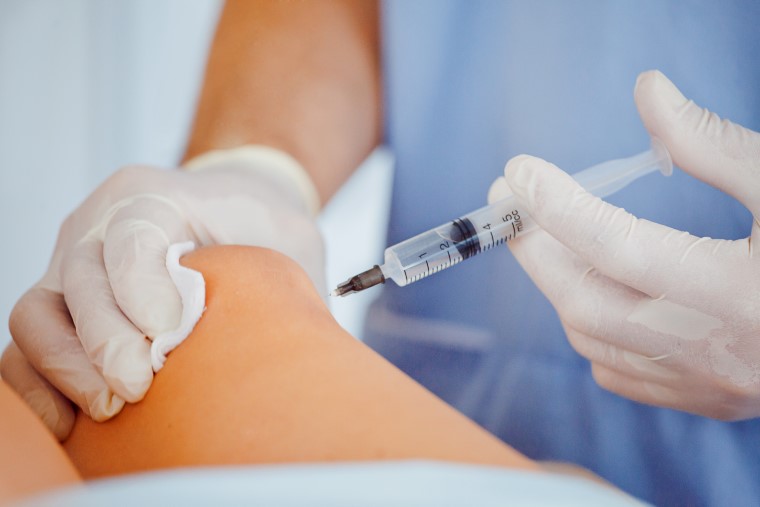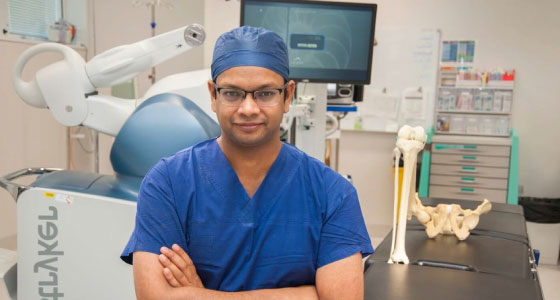Knee pain can often be debilitating, leading to a significant loss of motion and reduction in your overall quality of life. Individuals who suffer from chronic knee pain due to arthritis or other underlying degenerative conditions can regain mobility and alleviate their pain through the use of knee injections.
Depending on what knee symptoms you are suffering from and which condition is causing you pain, will depend on the type of substance used for the injection. If you feel like you can benefit from injections for knee pain, Melbourne residents can contact the experts at MOATI for help today.
What are knee injections?
Knee injections are designed to relieve pain, reduce swelling and improve function in patients suffering from joint pain. Used for patients suffering from any form of knee pain, they are carried out by injecting medications directly into or around structures of the knee joint. Their aim is to alleviate pain, restore your range of motion and facilitate exercise treatment.

Knee injections can be used to treat many forms of knee pain. Contact us to find out just how we can benefit you.
Which knee injections are used?
At MOATI there are 3 different types of injections that we use to treat knee pain:
Hyaluronic acid
Found in the synovial fluid surrounding joints, hyaluronic acid is a naturally occurring substance that acts as a shock absorber for joints and a natural lubricant enabling bones to move smoothly over each other. Patients suffering from osteoarthritis have a lower concentration of hyaluronic acid in their joints which causes them to suffer knee pain. Injecting hyaluronic acid directly into the knee joint facilitates movement and reduces pain.
Cortisone
Cortisone is used to reduce inflammation in knee joints, tendons and tendon sacs. The intra-articular injection relieves both pain and swelling and makes movement easier. Cortisone injections are designed to treat a number of medical conditions such as arthritis, tendonitis and bursitis.
Autologous conditioned plasma
To create Autologous conditioned plasma, blood is first drawn from patients. Then, through centrifugation, the platelets are separated from other blood cells. Platelets contain proteins called growth factors, which are very important in the healing of injuries. The Autologous conditioned plasma is then injected into the injured site to promote a healing response.
What are the benefits of knee injections?
There are a number of key benefits of knee injections:
- Increased joint lubrication
- Increased movement
- Pain relief
- Act as anti-inflammatories
- Improvement in function
- Promote healing of injuries
- Minimal side effects
- Minimal recovery time
- Delay the need for surgical treatment

Knee injections are used to alleviate the pain and discomfort caused by this condition.
Which conditions can knee injections treat?
- Knee osteoarthritis - Arthritis damages the cartilage causing friction in the joint leading to pain and stiffness. Knee injections for arthritis are very common and the treatment can significantly reduce pain, improve function and facilitate movement.
- Rheumatoid arthritis - There is no cure for rheumatoid arthritis but knee injections are used as an anti-inflammatory for patients suffering from the condition. The intra-articular injection helps reduce pain and inflammation.
- Tendonitis - Is an inflammation of the tendon which causes pain, swelling and loss of function. Autologous conditioned plasma injections can be used to help promote the regeneration of collagen in tendons, while cortisone helps relieve pain and swelling.
- Bursitis - Is an inflammation of the bursa, which are fluid-filled sacs located between the tendon and bone. This condition also causes pain, swelling and loss of function of the affected joint. A cortisone injection or autologous conditioned plasma is used as an anti-inflammatory to help ease any pain and swelling.
How are knee injections administered in Melbourne?
At our Melbourne clinic, the injections are carried out by our orthopaedic surgeon Dr Chandrasekaran. Each of the injections is prepared slightly differently.
The cortisone injection is mixed with a local anaesthetic before being administered whereas the hyaluronic acid injection comes in a prefabricated syringe. If you are receiving an Autologous conditioned plasma injection, blood will firstly be taken from the arm in order to separate the plasma using a centrifuge and then administered via a specialised syringe delivery system.
The following steps are followed upon administration of your knee injection:
- Once the substance is prepared, it is injected directly into the affected knee where it will begin to exert its anti-inflammatory properties. Dr Chandrasekaran will use an ultrasound to guide the injection into the specific joint or tendon space.
- A dressing, that can be removed the next day, is then used to cover the injection site.
The procedure takes approximately 20 minutes and you may continue with your normal daily activities (including driving) after the injection has been administered. However, we do advise you to refrain from any strenuous activities at least 48 hours after treatment.

Using ultrasound guidance, the knee injections are administered directly into the affected joint.
How much do knee injections cost in Melbourne?
The cost of injections is determined by which condition you are suffering from and the form of injection you’ll receive as a result. Book a consultation with us today for an accurate overall cost analysis of your treatment.
How can MOATI help?
We at MOATI work endlessly to ensure that we can offer you the safest and least invasive treatments possible for your knee pain. We pride ourselves on our patient-centred approach to healthcare, ensuring that all treatments are devised specifically to tailor to your individual needs. Talk with Dr Chandrasekaran about the different approaches to decrease your knee pain.

Dr Chandrasekan (FRACS MBBS) is an Australia trained orthopaedic surgeon who completed his undergraduate medical training and Masters in Sports Medicine at the University of New South Wales and completed a Masters of Surgery at the Australian National University. Since then he has honed his experiences following the completion of three prestigious surgical fellowships from the USA, United Kingdom and Switzerland.
FAQs
Some of the most common questions regarding knee injections are answered below.
Different knee injection preparations will last at different rates. Let’s take a look at how long they last below:
- Hyaluronic acid injections - 6 - 12 months
- Cortisone injections - Can last for up to 1-3 months
- Autologous conditioned plasma injections - These injections can last for up to 18 months.
With any knee injection, there is a small risk of a knee joint infection but these are very rare. All medical procedures come with some potential side effects and risks but knee injections are considered a safe procedure.
There are possible effects from any medical procedure but the most common side effect of this treatment is mild swelling and pain at the injection site.
Yes, Medicare will cover knee injections that are approved by the TGA.
